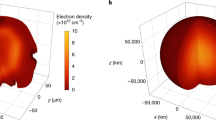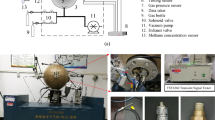Abstract
THE suggestion has been put forward by Prof. David and Mr. Pugh1 from the results of name temperature experiments that the large latent energies found in flame gases, due probably to excess intramolecular energy in the triatomic molecules formed during combustion, facilitate the dissociation of the products, with the result that excessive dissociation is observed. The results of a number of closed-vessel explosion experiments confirm this view, and also indicate that the degree of such dissociation is, as would be expected, dependent on the amount of latent energy associated with the products of combustion.
This is a preview of subscription content, access via your institution
Access options
Subscribe to this journal
Receive 51 print issues and online access
$199.00 per year
only $3.90 per issue
Buy this article
- Purchase on Springer Link
- Instant access to full article PDF
Prices may be subject to local taxes which are calculated during checkout
Similar content being viewed by others
References
See preceeding letter.
Phil. Mag., (7), 14, 764 (1932).
Phil Mag., (7), 22, 513 (1936).
Proc. Roy. Soc., A, 115, 318 (1927).
Author information
Authors and Affiliations
Rights and permissions
About this article
Cite this article
LEAH, A. Latent Energy and Dissociation in Explosions. Nature 145, 897–898 (1940). https://doi.org/10.1038/145897a0
Issue Date:
DOI: https://doi.org/10.1038/145897a0
Comments
By submitting a comment you agree to abide by our Terms and Community Guidelines. If you find something abusive or that does not comply with our terms or guidelines please flag it as inappropriate.



